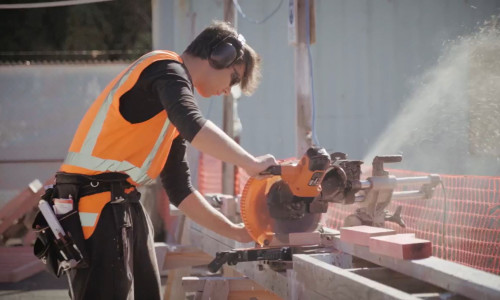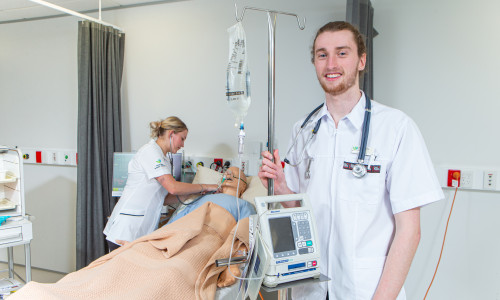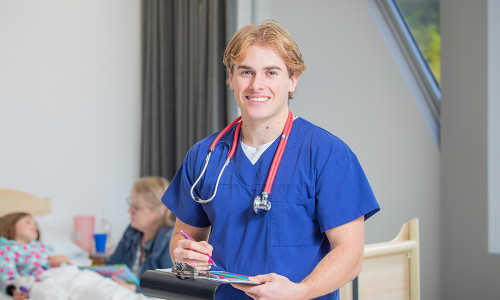Third year Whitireia Bachelor of Nursing ākonga (student) Emily Lake recently took a lead role in the Hauora Taiwhenua Rural Heath Network’s careers programme to educate rural rangatahi (young people) about a career in health.
Emily, who grew up in Ruapuna Canterbury, knows rural Aotearoa needs health professionals now more than ever. She was excited to see that the Rural Health Network had a programme to connect with rangatahi and share why nursing in a rural community is a valuable and rewarding career. Emily says she took the leap during the mid-year break this year and joined a group of tertiary ākonga from across a range of health specialities, including dentistry, nursing, paramedicine and operating theatre patient care.
As part of the group, Emily facilitated workshops with secondary school ākonga giving them the chance understand the type of health services they could provide to their community. "As well as giving rangatahi a hands-on go at CPR, taking blood pressure and eye testing, we also talked about the pathways into a career in health, including scholarships, assistance from Te Whatu Ora, and gaining experience through services like St John."
While not initially expecting to be group leader, Emily says that she felt well prepared to take on the additional work to set up the sessions with secondary schools, arrange visits to medical practices, coordinate session content as well as sorting accommodate and funding.
"I was excited to take on the lead role for the group and manage logistics as well as the teaching aspect and group dynamics. There’s a very diverse aspect to rural nursing where nurses have to work with a range of health teams and specialities, and manage crucial logistics and health practices, which might include ongoing training, triage over the telephone or telehealth, care for tourists and holidaymakers, arranging mobile theatre services and emergency response. Nurses really are the backbone of health in Aotearoa, supporting the wider network of specialists, GPs, nurse practitioners and paramedics."
Carmel Haggerty, Head of School for Health and Wellbeing at Whitireia and WelTec, explains that the Rural Health careers programme was a great opportunity for Emily. Taking a lead role in the programme, Emily was able to connect with secondary school students, share what a career in nursing involves, and outline how being part of the health service in rural or smaller communities really does make a tangible difference. "Emily is a fantastic ambassador! We’re thrilled that our nursing ākonga can draw on their skills and talent, step into leadership roles and educate the next generation of health professionals."
Emily says that it’s incredibly meaningful knowing that there’s a career where you can make a difference in your community. She’s keen to return to her rural Mid-Canterbury roots once she has gained experience across a range of health and medical specialities, as she knows that anything can arise in a rural setting, and she will need to be able to draw on a wide range of skills and knowledge.
Dr Grant Davidson, CEO of Hauora Taiwhenua, commented that, "it is the enthusiasm, skill and commitment of people like Emily that make our rural health careers programmes in schools so successful. The rangatahi she and her peers visit can relate to those close to their own age who are going through tertiary training just a few years ahead of them. Those tertiary students are in a perfect position to answer questions and allay fears about entering tertiary training. The rural workforce is looking more positive with the passion and energy of people such as Emily coming through, ready to accept the challenges and opportunities of embracing a rural health career."




